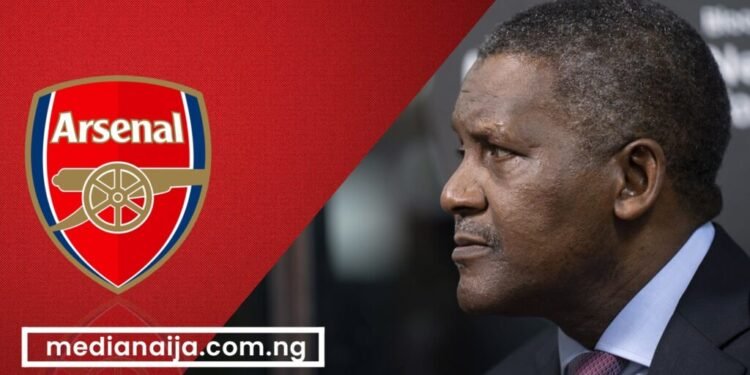
Africa’s richest man, Aliko Dangote, says it appears that the “time has passed” for him to buy the Arsenal soccer club, a deal he once publicly expressed interest in.
Speaking with Bloomberg’s Francine Lacqua in New York, Dangote reflected on the missed opportunity, explaining that economic realities have changed since his first ambition to buy the soccer club.
“The last time we had this interview, I said as soon as we finish the refinery, I am going to try and buy Arsenal. But the issue is that everything has gone up. And the clubs too are doing extremely well. At that time, Arsenal wasn’t doing very well,” Dangote explained.
He expressed regret over not acquiring the club for $2 billion when the opportunity presented itself, but noted that his financial focus was on completing his massive refinery project in Nigeria, which he described as a higher priority.
“I would have bought it for $2 billion, but I wouldn’t have been able to finish my project. So, it was either you finish your project or buy Arsenal,” he said.
With Arsenal’s value significantly higher, Dangote explained that it no longer makes sense for him to purchase the club, especially with a price tag reportedly reaching $4 billion. He added that he doesn’t have the “excess liquidity” required for such a purchase and would rather invest in more impactful ventures.
However, the billionaire says his commitment to Arsenal remains unwavering, despite not becoming the club’s owner. “I will continue to be the biggest fan of Arsenal. I watch their games every day. I will remain a major supporter of the club, but I don’t think it makes sense today to buy Arsenal.”
Reflecting on his decision, he stressed that completing his landmark refinery in Nigeria was the right choice. The refinery, which he described as a topic of global discussion, has a refining capacity that represents about 1.1% of the world’s total.
When asked if he would take on another project of this magnitude, Dangote responded humorously, “I won’t do this kind of huge refinery project again. Doing this refinery is what gave me my grey hair.”
Dangote also commented on Nigeria’s gasoline subsidy, calling it a “sensitive issue” for a nation accustomed to cheap fuel. However, he emphasized the need for reform, especially as his refinery’s output is expected to help alleviate pressure on the country’s struggling currency.









